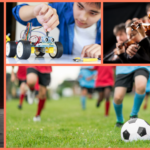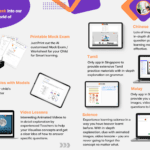The future of education in Singapore is looking brighter than ever before with the implementation of Full SBB from 2024 Secondary 1 cohort. Students will now have greater flexibility and customisation in their learning, allowing them to discover and develop their strengths and interests throughout their secondary school journey.

There Will Be No More Streaming
Gone are the days of streaming and being confined to one particular group. Instead, students will start in one of three Posting Groups, which will only be used to guide subject levels and facilitate entry into secondary school. This means that students will be in mixed-form classes, providing them with more opportunities to interact with peers of different backgrounds, strengths, and interests. This will help nurture inclusivity and promote a sense of community in the classroom.
Embracing Full SBB and Inclusive Learning
Under Full SBB, students will have the opportunity to customise their learning experience based on their strengths, interests, and learning needs. They can adjust their subject levels throughout their secondary school journey, allowing them to take more demanding subjects, such as Humanities, or offer some subjects at a less demanding level, including elective subjects at the upper secondary level. Additionally, MOE will provide more opportunities for students to take up subjects and programmes that were previously stream-based.
The Future of Assessments
Starting from the 2027 graduating cohort, students will sit for a common Singapore-Cambridge Secondary Education Certificate, replacing the N-Level and O-Level certificates. The existing JC admission criteria remains relevant and will be retained, providing students with a clear path towards tertiary education.
Pacing Your Education with a Fifth-Year Option
For students who wish to pace their learning, the option of a fifth year remains. This allows them to offer G3 subjects in fifth year and better prepare for their tertiary education.
Greater Collaboration and Inclusivity for SPED Students
In addition to these exciting changes, there will be more meaningful partnerships between mainstream and SPED schools. Through joint CCAs, recess, workshops, and camps, SPED students will have social interaction opportunities with mainstream students, helping them to integrate into society.
Furthermore, the quality of SPED education will be improved with the introduction of two new SPED Teaching and Learning Syllabuses to teach communication and social-emotional skills. This will help students live independently, learn continuously, and work productively after they leave school.
Conclusion
Overall, the future of education in Singapore is bright and full of possibilities. With Full SBB, students will have the opportunity to customise their learning experience, promoting inclusivity and community in the classroom. The implementation of new partnerships between mainstream and SPED schools and the improvement of SPED education will nurture a more compassionate and understanding society.













